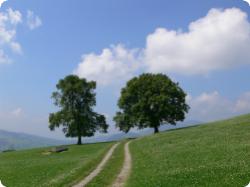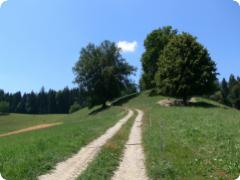Thoughts on the path

Whoever builds a path, builds forward, takes a first step
Sermon District Synod Schwarzenburg, 23.8.98 – Ueli Häsler, Merligen
"He who builds a path, builds forward, takes the first step
Whoever builds a path will never be finished, think further
Whoever builds a path faces life anew every day
Whoever builds a path, builds into the distance and into the heights
Whoever builds a path does not build a dead end, seeks encounters
Whoever builds a path has a goal, seeks life and the One who creates life."
If you look out from the summit of the Sigriswiler Rothorn on a clear late summer day into the beautiful, freshly washed landscape, you can see how hundreds of small paths hold the villages, fields and forests together like a network.
Paths connect one neighbor with another, one village with another, one region with another region...
Paths enliven our landscape like bloodstreams. Wherever they cross, life comes alive, trade takes place, and exchanges take place. Paths are the visible signs of a civilization that interacts peacefully with one another.
Through their vastness, paths allow hikers to experience depth. Those who walk them become expansive and open...
Paths enable encounters, encounters with the landscape, nature, people and animals, but also encounters with the foreign, the unknown and with oneself.
Moving paths. The word "Weg" is contained in the word "wegen-" (move). The word "wegen" (move)
points out that whoever sets out on the journey, moves with body and soul, it points out that he himself is also moved, his body and also his soul.
Whoever sets out on a journey walks and grows with creation; whoever stands still no longer grows...
So if we seek to encounter God and his wonderful creation, then we must set out on the path, set out on new paths... following the path.
Following the path that someone before us has already taken, which he said is the way.
And because it is Christ who said this, we know that even the longest and most difficult path in this world is not a dead end in an insane labyrinth.
And because it is Christ who said this, we know that he is with us on the way, that he accompanies us, holds us when we stumble, and shines in the darkness, bringing us safely home.
When I look out into the countryside from the Sigriswiler Rothorn on a clear late summer day and see the many little paths, I feel joy, joy that our regions are connected by paths.
Joy that the Way of St. James, the greatest path of meaning in the 2,000-year history of Christianity, winds through this very landscape. But the joy grows even greater when I consider that the Schwarzenburg region, the Gürbetal valley, and the Oberland region meet on this path to eternity, to set out, to walk a small part of this path together, united with the one who, through his great love, unites all things, united with Christ.

Bernese German version
If you were to weigh, to move forward, he would take the first step
If a road is about, it will never be finished, continue
If a path is over, life presents itself, every day new
Would be on the wagon bout, bout id' Wyti and id' Höchi
If you're on the road, don't go to a dead end, look for someone to meet.
If you're on the wagon, it's a good idea to look for the place where the place creates.
If you look out at the beautiful, freshly washed landscape from the summit of the Sigriswiler Rothorn on a clear late summer day, you will see how hundreds of small wagons connect the villages, fields and forests like a net.
Weighs connect neighbor with neighbor, village with village, region with region...
Weighs live like flowerbeds in our landscape. Where the weighs yawn, life comes alive, trades and exchanges take place. Weighs are the visible signs of civilization where people live peacefully.
For their part, the hiker experiences adventures before the devil. Whoever goes after them will be witty and open...
Weigh possible encounters, encounters with the landscape, with nature, with people and animals, but also encounters with strangers, with the unknown and with oneself.
The word "Wäg" (way) is contained in the word "beweg" (to move). The word "beweg" means "to move" that means "to move" on a path, to move, with love and soul, and means "to move" oneself, with love and soul.
If you set out on a path, you will grow with creativity; if you stay still, you will grow no more...
So if we want to encounter God and his wonderful creation, we don't have to set out on a path, set out on a new path...near the path.
Near the road where one went before us, where it stood, that is the road.
And if Christ is where this is going, we would know that even the longest and most difficult path in this world is not a dead end in an insane labyrinth.
And if Christ were where he was, we would know that he is with us on the path, that he accompanies us, that he has us when we fall, that he lights our fishing nets, and that he brings us home safely. When I look out over the countryside from the Sigriswiler Rothorn on a clear late summer day and see the many paths, the overwhelming joy that our regions are united by this path. Joy that the Way of St. James, the greatest path of meaning in 2,000 years of Christian history, winds right through this landscape. But the joy will be even greater when I see on the dike that the Schwarzeburgerland, the Gürbetal and the Oberland meet on the road to eternity, to set off together, to walk a part of the road, united with that where everything is united by his great love, united with Christ.
Ueli Häsler